May 21, 2025 | 04:05 GMT +7
May 21, 2025 | 04:05 GMT +7
Hotline: 0913.378.918
May 21, 2025 | 04:05 GMT +7
Hotline: 0913.378.918
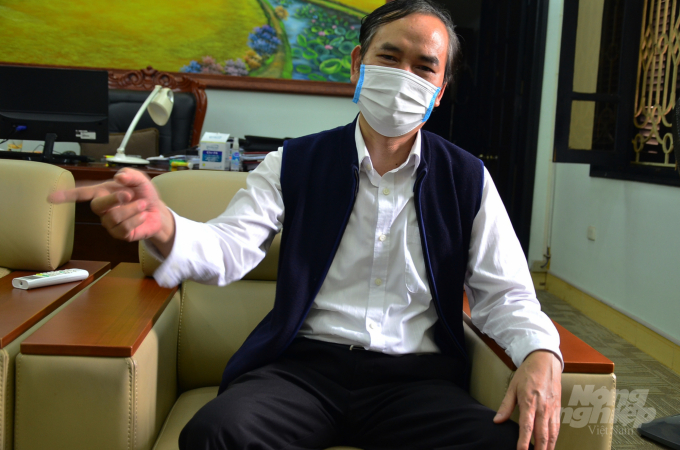
Mr. Tran Thanh Hai, Director of Vinh Phuc Department of Agriculture and Rural Development. Photo: Duong Dinh Tuong.
Society is moving towards the next page, and people's needs are constantly on the rise. Requirements for safe agro-products that are both health-beneficial and farming-efficient have urged the agriculture sector to follow the path of safe production. It is an inevitable movement, a necessary change in farming practices so that product quality and value can be improved and meet consumers' expectations of a cleaner food system for daily lives.
Upon the importance of agriculture in this land, and also to answer the question: "How is its safety guaranteed?", Vietnam Agriculture News reporter had had an interview with Mr. Tran Thanh Hai, Director of Vinh Phuc Department of Agriculture and Rural Development.
Dear sir, it is to my knowledge that Vinh Phuc is a pioneer in biopesticide support to reduce chemical pesticide usage. How did the province raise the awareness of localities, particularly the people, to change the old habits?
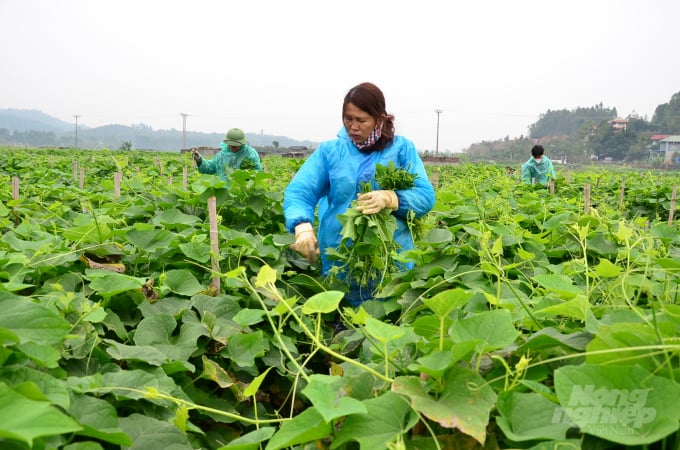
Collecting chayote in Ho Son commune, Tam Dao district. Photo: Duong Dinh Tuong.
To help people change their habits from using chemical pesticides to biological pesticides, our provincial Department of Agriculture and Rural Development actively conducts training conferences; promotes the building of green and organic-oriented agroproduction models, VietGAP, IPM, SRI, value chain production models; actively coordinate with media agencies such as Vinh Phuc Newspaper, Vinh Phuc Radio and Television Station, Provincial Portal, Agriculture and Rural Development Website, and local radio system to spread the word.
We also have long-term policies, extended in many years. The first ones were simply about supporting seeds, then we were able to support in terms of micro-fertilizers, and finally biopesticides. Looking from the big picture, I see that through each stage of thorough thinking, Vinh Phuc's way of supporting people has improved, in line with the needs of daily lives.
How were the results of the biopesticides support policies? Did they match the province’s expectations? And were there any obstacles in the process?
The biopesticides support expands the safe agroproduction area (the figures are higher with each passing year) and serves as clear evidence to the increase in the agro-product volume as well as the assurance of the market’s food safety.
In 2020 and 2021 alone, with nearly 5,000 ha of green and organic-oriented crop production, approximately 4,300 tons of microbial organic fertilizers have been utilized, contributing to reducing the use of 2,000 tons of inorganic fertilizers and over 2,500 kg of chemical pesticides.
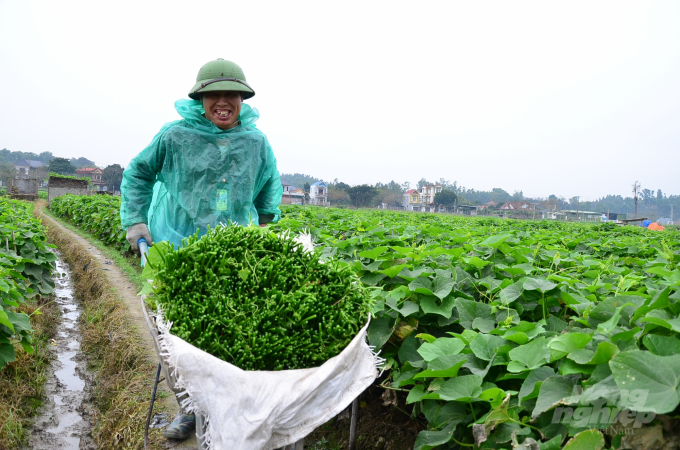
Moving chayote from the field to the main road for consumption. Photo: Duong Dinh Tuong.
The support policies also help raise farmers' awareness about safety and efficiency in production and protection of health and the ecosystem. The positive results they themselves experience motivate them to actively participate in the movement. Crops are now produced in the direction of safety, the goods all ensure high yield, quality and profits.
Through preliminary economic accounting, it can be seen that after deducting costs, pumpkin profits are nearly VND 90 million/ha; cucumber VND 120 million/ha; peppers and tomatoes nearly VND 100 million/ha; potatoes nearly VND 80 million/ha.
Nevertheless, a number of difficulties still exist.
Market prices are unstable. Input prices are high while the selling prices are low, not to mention the agro-product markets are constantly in an unpredictable state, so many farmers are no longer interested in production.
The complicated situation of the Covid-19 pandemic has made it difficult to conduct training, propaganda, and support for production and consumption of products.
A part of agricultural laborers still has limited insight into the benefits of using biopesticides and incline to prevent pests quickly and thoroughly by using chemical pesticides.
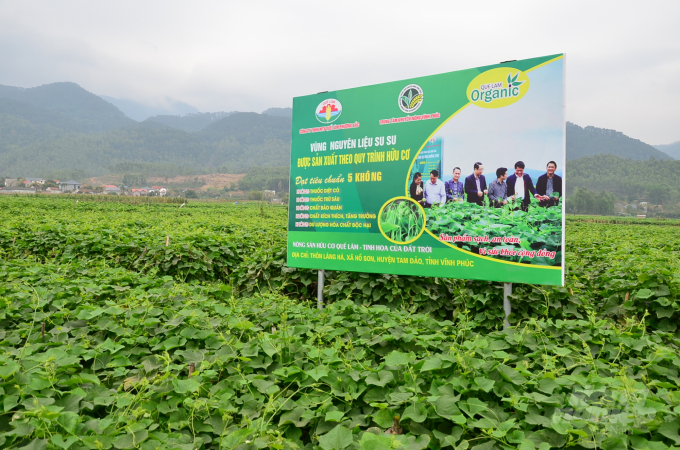
The rubber plantation area of Ho Son commune, Tam Dao district. Photo: Duong Dinh Tuong.
What is your view on responsible agriculture? From that point of view, what specific steps do you think Vinh Phuc needs to take when implementing it in reality?
Facing the requirements of food safety, international economic integration, each of us (from managers and policy makers to producers, traders, and consumers of products) deem it essential to have responsibilities in accordance with our obligations and functions to both construct safe, effective agriculture and ensure sustainable development in the future.
In my opinion, the solution to implement responsible agriculture in the near future include:
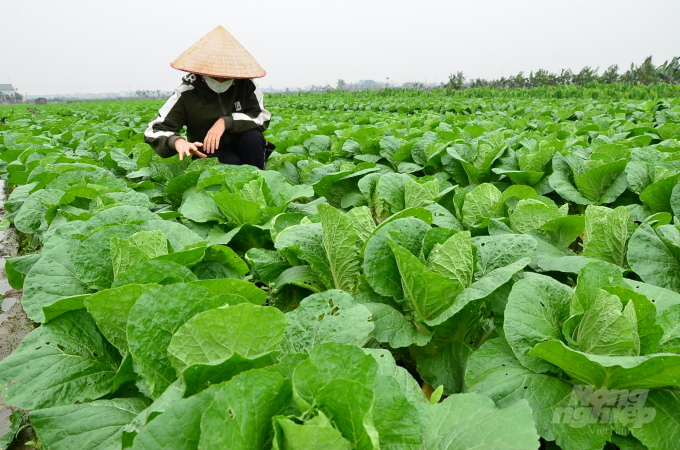
Vegetable growing model in Van Hoi commune, Tam Duong district. Photo: Duong Dinh Tuong.
Thank you, sir!
Translated by Samuel Pham

(VAN) Dong Thap farmers attained an average profit margin of 64% during the summer-autumn 2024 crop (first season), while An Giang and Kien Giang farmers followed with 56% and 54%, respectively.

(VAN) As a doctoral student doing research on renewable energy and electrification at Harvard University, the author shares his musings on electricity, nature, and countryside memories.

(VAN) The decree on Extended Producer Responsibility (EPR) ensures transparent management and disbursement of support funds, avoiding the creation of a “give-and-take” mechanism.

(VAN) Hue City rigorously enforces regulations regarding marine fishing and resource exploitation, with a particular emphasis on the monitoring of fishing vessels to prevent illegal, unreported, and unregulated (IUU) fishing.

(VAN) Hanoi People's Committee has issued a plan on reducing greenhouse gas emissions in the waste management sector with 2030 vision.

(VAN) Vietnam's draft amendment to Decree No. 156 proposes a mechanism for medicinal herb farming under forest canopies, linking economic development to population retention and the sustainable protection and development of forests.

(VAN) In reality, many craft village models combined with tourism in Son La have proven effective, bringing significant economic benefits to rural communities.